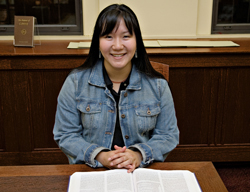Strength of Heart and Mind
In a native community in
"It was culturally appropriate," Huaman said, "because it was teaching specifically for boys. In their culture, there are specific teachings for girls, too.
"My interest is to work with communities to design and establish youth programs that are based in that particular culture, incorporating languages and using community resources," says Huaman, now a second-year Ed.D. student in TC's International Educational Development program who is studying education in native communities of North and
Huaman's mother is of the Huanca culture that is indigenous to
Huaman has since spent time with the Navajo and
In each of these cultures, education is part of a very organized, structured way of living that everyone - rom children to elders - participates in. "If you go to any of these communities, you can witness planting, maintenance of crops, and harvest time," she says. "We think of education as being schooling in the classroom, but these types of educational systems, I argue, are just as important--and maybe more so--as mainstream western-based school."
While outsiders might contrast such learning with the "formal" education that goes on in classrooms, Huaman prefers the words used for education in her mother's native language, Quechua: songo for "heart" and uma for "head" or "mind." Being strong in both heart and mind "is what leads to a healthy, whole, productive person," she says--a goal that nearly all educators would agree they share.
Huaman's dissertation research focuses on practices within native cultures that are based on traditional ecological knowledge - pre-Colombian practices that lend themselves to sustainability. Her international comparative study of indigenous communities in
"With indigenous communities, communication is not only to other human beings but also to everything in creation - to everything around you, living and non-living," she explains. "Language carries a certain depth related to one's particular location."
Each culture has its own strengths, she adds, as well as its own archives and its own reasons for students to stay, appreciate and form a deeper understanding of the community in which they live.
For any culture, that sounds appropriate indeed.
Published Wednesday, Dec. 13, 2006
